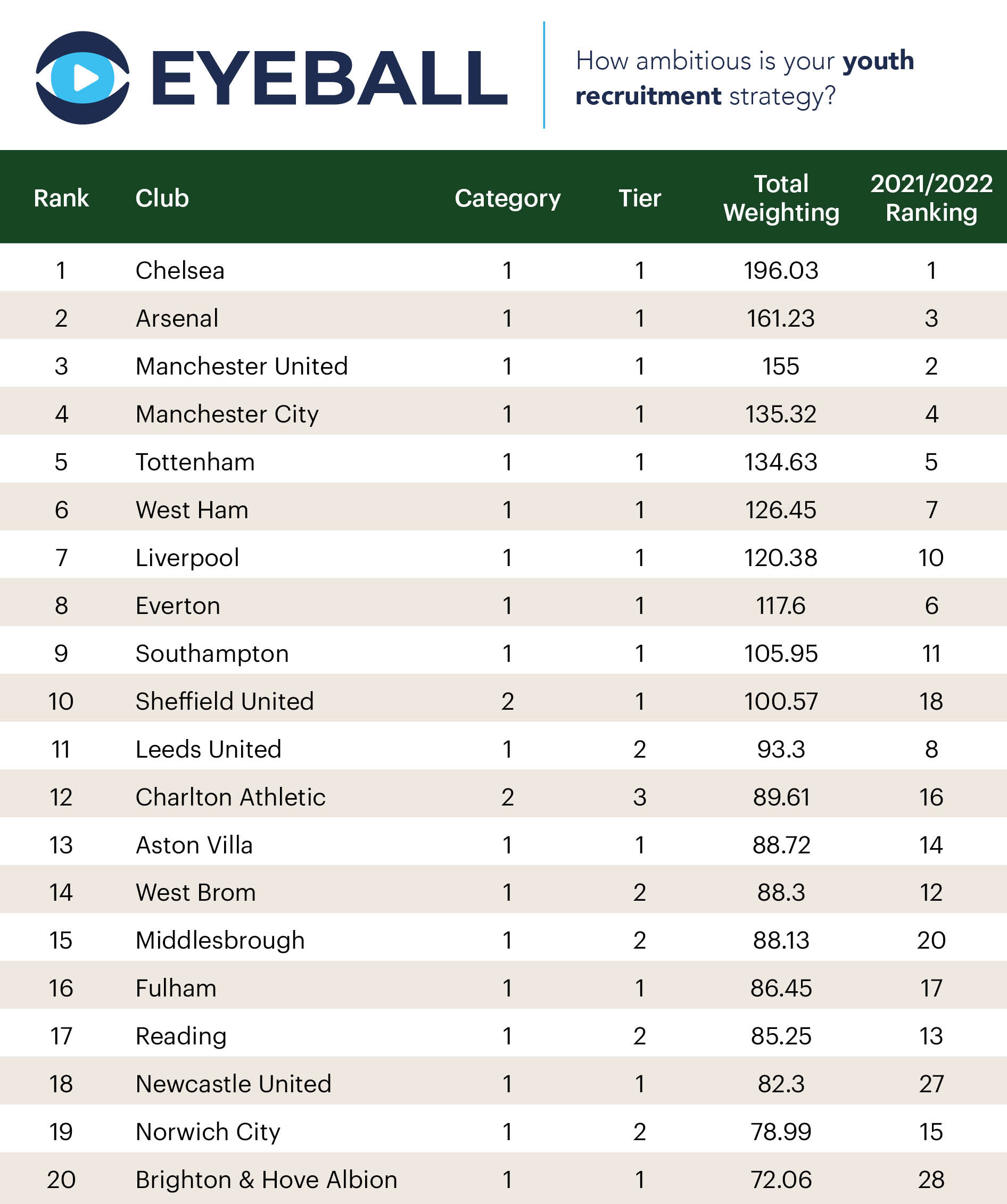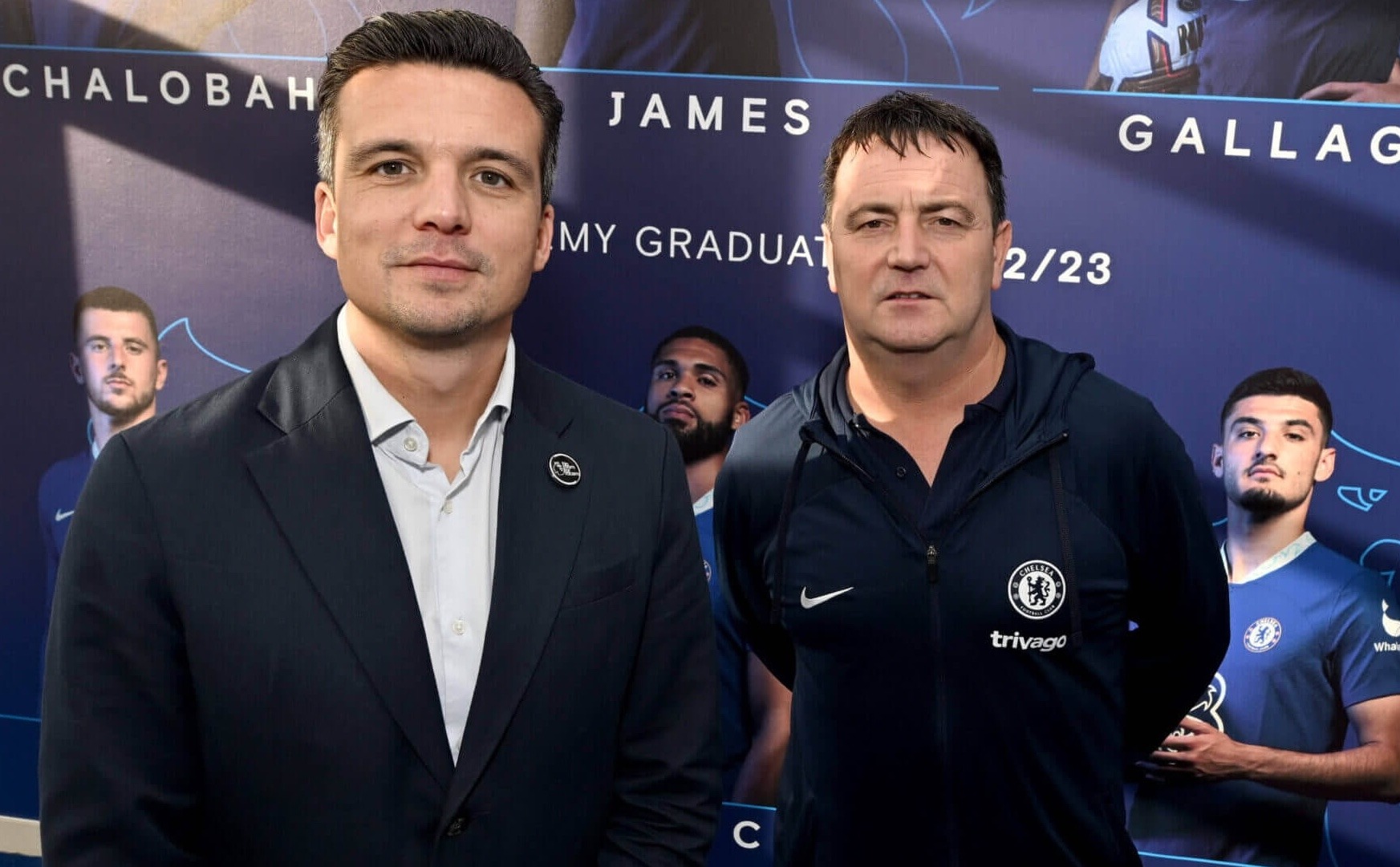
Chelsea top Academy Productivity Rankings for second time in a row
Written by
Josh Schneider-Weiler
October 8, 2024
Chelsea have topped TGG’s exclusive Academy Productivity Rankings for the second edition in a row – and extended their lead over second-placed Arsenal and Manchester United in third.
The Rankings, sponsored by Eyeball, the ultimate digital platform for youth football, are the only publicly-available resource of their kind and rank English Academies from Categories One to Three according to the number of their graduates who made at least one league appearance in the 2023/24 season.
To see the Full Rankings – plus added insight and analysis – you will need to become a TGG Member. We currently have a special Introductory Offer of just £9.99 for three months or £29.99 for a year, which is available until February 28th.
For the first time, the Rankings take account of English Academy graduate appearances in the other Top Four European Leagues – La Liga, the Bundesliga, Serie A and Ligue 1 – in 2023/24. This has helped Chelsea to extend their lead at the top, because four of their graduates – Tammy Abraham, Fikayo Tomori, Ruben Loftus-Cheek and Samuel Iling-Junior – played in Serie A last season.
Arsenal have climbed one place to second, leapfrogging Manchester United, who drop to third.
Chelsea have by far the greatest score for Premier League appearances (18.83) and finished almost 30 points ahead of Arsenal with their overall weighted score of 196.03. As in previous editions, weighting was given according to the league in which a player appeared, with more points given for a Premier League than Championship appearance and so on.
Points were also split evenly between Academies if a player attended more than one.
Chelsea’s top spot seems particularly pertinent this season, because the architect of their modern Academy, Neil Bath, left the club in July along with his long-time assistant Jim Fraser. Combined, the duo had worked for the Academy for more than 50 years.
Bath joined the Blues as a part-time schoolboy coach in 1993, when the youth teams trained at Battersea Park on weekdays. He went on to become Assistant Academy Manager in 2002, Academy Manager in 2004 and Director of Football Development and Operations in 2022. Overall he worked for three owners and 25 first-team managers.
When Chelsea topped the 2021/22 Academy Rankings, former Premier League Director of Youth Ged Roddy MBE described Bath as the “stand-out practitioner in player development in this country” and “the fabric of Chelsea”. Following the departure of Bath and Fraser, Glenn van der Kraan was hired from Manchester City to become Chelsea’s Academy Technical Director, with Jack Francis stepping up to become Head of Academy Operations.
Francis has been with the club for almost 14 years, mainly in Player Care roles, before being appointed Academy Manager for the U9s to U16s in December 2022.
All of the clubs in the top 10 of the Academy Productivity Rankings are Premier League and Category One, with the honourable exception of Category Two Sheffield United, who have jumped from 18th in the last edition of the rankings (2021/22) to 10th this time.
In fact all of the top 20 are Category One, except for Sheffield United and fellow Category Two side Charlton Athletic. The League One Addicks are in 12th position, up from 16th in 2021/22. Earlier this month, their Academy Director Steve Avory announced he was stepping down from his position after 23 years at the club.
Elsewhere, Liverpool have jumped from 10th in 2021/22 to seventh in this edition. They had 56 players playing in England’s top-five leagues last season – 20 more than two years ago. ‘Klopp’s kids’ were hailed for their Carabao Cup final win over Chelsea in February 2024 and have now achieved their highest placing in the rankings since 2017/18.
Newcastle United are another notable riser, going from 27th in 2021/22 to 18th this time. Their former Sporting Director Dan Ashworth, who is now at Manchester United, had made Academy productivity a key priority during his time at the club. Meanwhile, Newcastle’s near neighbours Middlesbrough have also risen significantly, from 20th to 15th.
Crewe Alexandra are the biggest fallers in this year’s rankings, dropping from ninth in 2021/22 to 25th for 2023/24. Bolton Wanderers have dropped from 22nd to 35th, and Plymouth Argyle from 31st to 45th.
Only two Category One Academies – Wolves (32nd) and Stoke City (47th) – are outside of the top 30 in the rankings, again showing the pulling power and productivity of the top tier. Exeter City lead the way for the Category Three sides, in 31st place, edging out the likes of Wolves, QPR, Stoke and Burnley.
Previous editions of TGG’s Academy Productivity Rankings:
- 2016/17: 1. Manchester United, 2. Arsenal, 3. Chelsea. SEE FULL TABLE
- 2017/18: 1. Manchester United, 2. Arsenal, 3. Tottenham. SEE FULL TABLE
- 2020/21: 1. Manchester United, 2. Arsenal, 3. Chelsea. SEE FULL TABLE
- 2021/22: 1. Chelsea, 2. Manchester United, 3. Arsenal. SEE FULL TABLE
- 2023/24: 1. Chelsea, 2. Arsenal, 3. Manchester United. SEE FULL TABLE
METHODOLOGY
This is the fifth edition of Training Ground Guru’s Academy Productivity Rankings and I have followed the same methodology as in previous years.
A list was compiled of male English players (ie players eligible in the 2023/24 season to play for the England men’s national team) who played in at least one match for any team in the top five English leagues, based on data from the www.fbref.com website for the Premier League, Championship, League One and League Two. The website, www.Transfermarkt.com was used to compile players in the National League as these were not available on www.fbref.com for the National League season.
Information on the Academy, or Academies, attended by each English player who had made at least one league appearance was then collated and cross-referenced from information in Wikipedia, club biographies, news sources and www.Transfermarkt.co.uk. A total of 1,966 players qualified for this study under these criteria.
An Academy, Centre of Excellence or other club training structure was counted as having contributed to a player’s development if he was in attendance there at any point up to the age of 18.
As in previous editions, a weighting is applied according to the league in which the player appeared, with more points given if they played in the Premier League and so on.
If they played in more than one Academy (as many did) then the points are split evenly between them. There are players who may have been produced by these Academies who, for various reasons, may not be included in the research.
Players who are not listed as English on www.fbref.com were not included.
This year we have decided to omit Welsh clubs from the rankings, even though they are part of the Elite Player Performance Plan. This is because we are only counting English players and this is a tremendous disadvantage for teams like Swansea City and Cardiff City, for obvious reasons.
For the first time qualified players in the Bundesliga, Ligue 1, Serie A and La Liga were counted in these rankings. However, players in other European leagues were not counted.
Follow Us
For latest updates, follow us on X at @ground_guru






